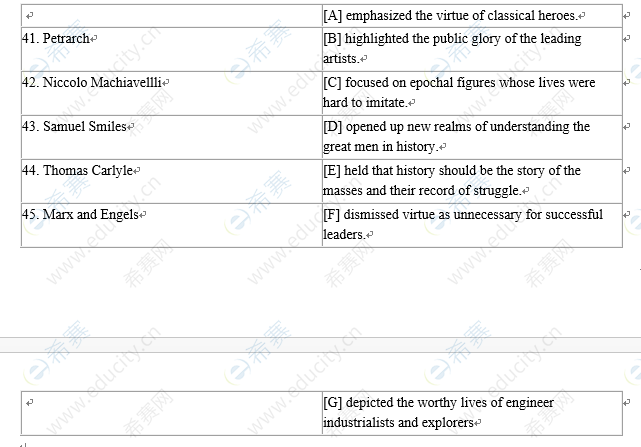2012年考研英语二新题型
摘要:考研英语真题是最好的复习资料,认真研读近十年的考研英语真题将会收到极大的成效,多做真题,反复做真题,仔细推敲真题。以下是为大家分享的2012年全国硕士研究生入学统一考试英语二新题型试题内容。更多考研英语真题相关资讯,请关注希赛网英语频道。
Part B
Directions:
Read the following text and answer the questions by finding information from the right column that corresponds to each of the marked details given in the left column. There are two extra choices in the right column. Mark your answers on ANSWER SHEET 1. (10 points)
“Universal history, the history of what man has accomplished in this world, is at bottom the History of the Great Men who have worked here,” wrote the Victorian Thomas Carlyle. Well, not any more it is not.
Suddenly, Britain looks to have fallen out with its favorite historical form. This could be no more than a passing literary craze, but it also points to a broader truth about how we now approach the past: less concerned with learning from forefathers and more interested in feeling their pain. Today, we want empathy, not inspiration.
From the earliest days of the Renaissance, the writing of history meant recounting the exemplary lives of great men. In 1337, Petrarch began work on his rambling writing De Viris Illustribus—On Famous Men, highlighting the virtus (or virtue) of classical heroes. Petrarch celebrated their greatness in conquering fortune and rising to the top. This was the biographical tradition which Niccolo Machiavelli turned on its head. InThe Prince, he championed cunning, ruthlessness, and boldness, rather than virtue, mercy and justice, as the skills of successful leaders.
Over time, the attributes of greatness shifted. The Romantics commemorated the leading painters and authors of their day, stressing the uniqueness of the artist’s personal experience rather than public glory. By contrast, the Victorian author Samuel Smiles wrote Self-Helpas a catalogue of the worthy lives of engineers, industrialists and explorers. “The valuable examples which they furnish of the power of self-help, of patient purpose, resolute working and steadfast integrity, issuing in the formation of truly noble and manly character, exhibit,” wrote Smiles, “what it is in the power of each to accomplish for himself.” His biographies of James Watt, Richard Arkwright and Josian Wedgwood were held up as beacons to guide the working man through his difficult life.
This was all a bit bourgeois for Thomas Carlyle, who focused his biographies on the truly heroic lives of Martin Luther, Oliver Cromwell and Napoleon Bonaparte. These epochal figures represented lives hard to imitate, but to be acknowledged as possessing higher authority than mere mortals.
Not everyone was convinced by such bombast. “The history of all hitherto existing society is the history of class struggles,” wrote Marx and Engels in The Communist Manifesto. For them, history did nothing, it possessed no immense wealth nor waged battles: “It is man, real, living man who does all that.” And history should be the story of the masses and their record of struggle, As such, it needed to appreciate the economic realities, the social contexts and power relations in which each epoch stood. For:“Men make their own history, but they do not make it just as they please; they do not make it under circumstances chosen by themselves, but under circumstances directly found, given and transmitted from the past.”
This was the tradition which revolutionized our appreciation of the past. In place of Thomas Carlyle, Britain nurtured Christopher Hill, EP Thompson and Eric Hobsbawm. History from below stood alongside biographies of great men. Whole new realms of understanding—from gender to race to cultural studies—were opened up as scholars unpicked the multiplicity of lost societies. And it transformed public history too: downstairs became just as fascinating as upstairs.

答案:41-45:AFGCE
延伸阅读

考研微信公众号

考研备考资料免费领取
去领取
- 3
- 0
- 8
 专注在线职业教育25年
专注在线职业教育25年









 扫描二维码
扫描二维码
 扫描二维码
扫描二维码








